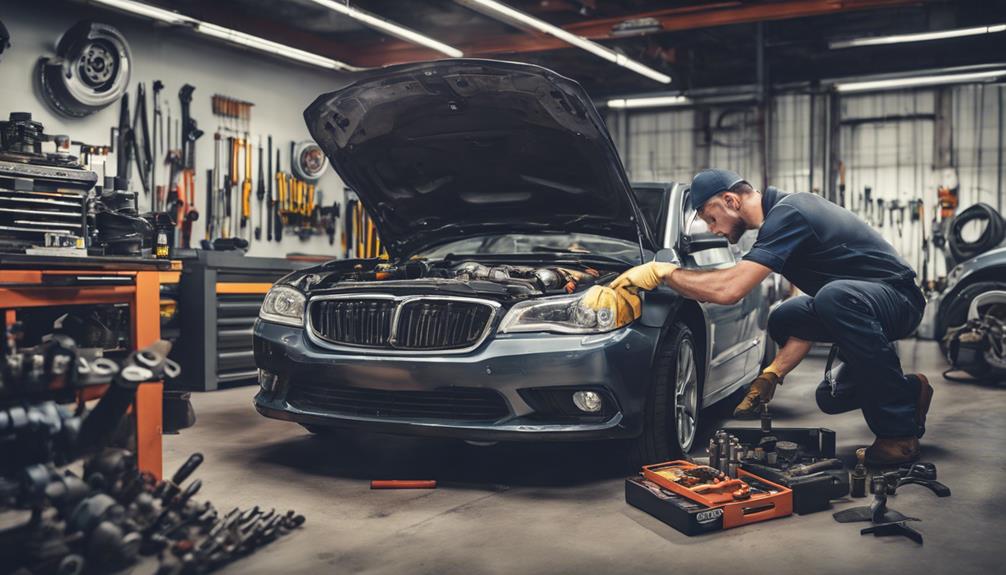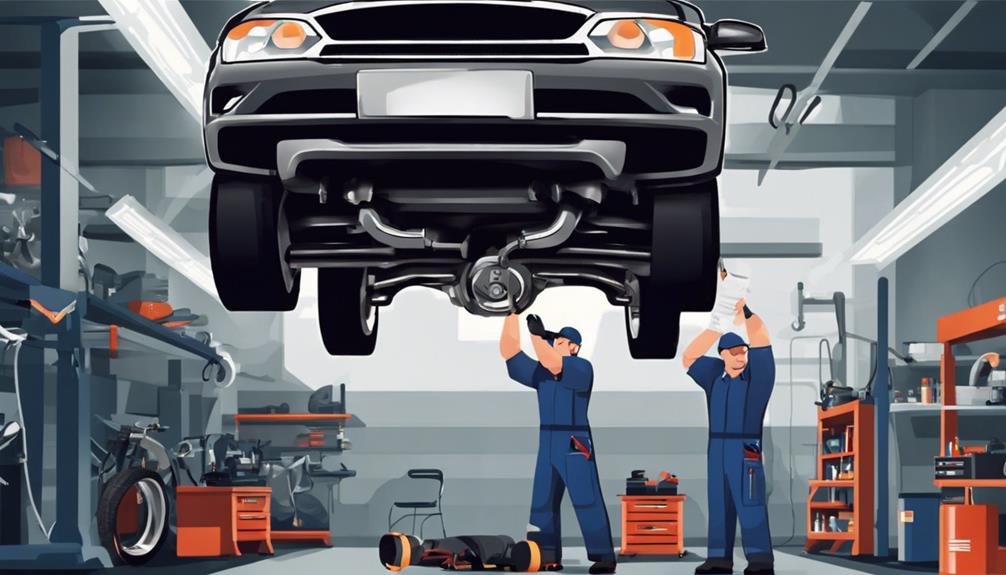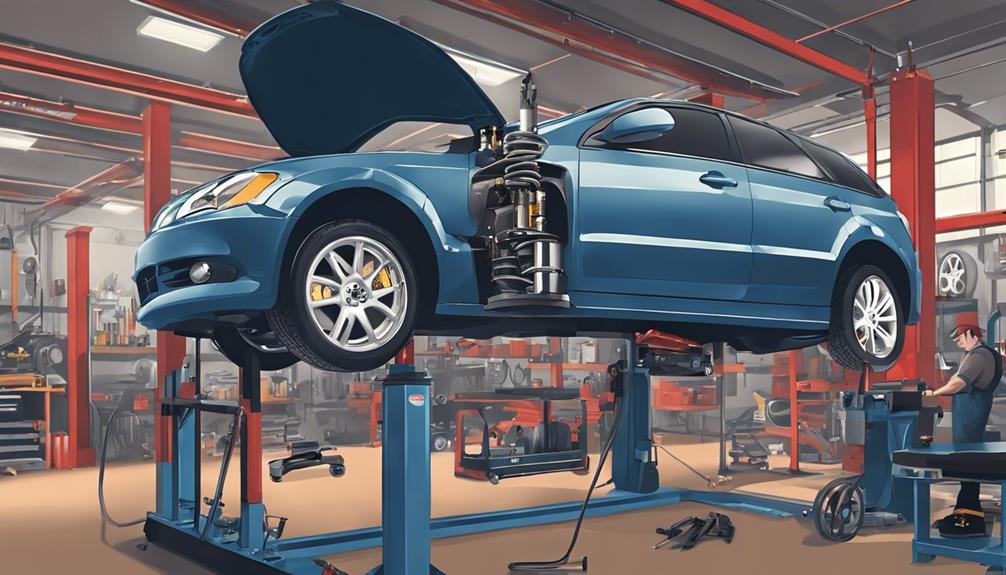Maximize your vehicle's performance and comfort by mastering suspension system essentials. Identify symptoms of potential issues like rough rides, unusual noises, or tire wear for proactive maintenance. Repair and upgrade wisely with quality parts and professional assistance for precision. Explore options like adjustable coilover kits and upgraded sway bars for tailored enhancements. Expert guidance guarantees accurate diagnostics, customized solutions, and overall peak performance. Intrigued by the possibilities? Learn more about maximizing suspension health and performance to revamp your ride seamlessly.
Key Takeaways
- Explore suspension upgrades for enhanced performance and comfort.
- Consider adjustable coilovers and performance shocks for a customized solution.
- Seek professional assistance for precise diagnostics and tailored recommendations.
- Stay informed about suspension trends and technologies for optimal ride quality.
- Upgrade sway bars and control arms for improved handling and stability.
Suspension System Basics
What are the fundamental components that comprise a vehicle's suspension system? The suspension system of a vehicle consists of various components that work together to provide a smooth and controlled ride. These components include springs, which support the weight of the vehicle and absorb shocks; shock absorbers or struts, which dampen and control the motion of the springs; control arms, which connect the suspension to the chassis; bushings, which reduce friction and vibration; and the sway bar, which helps stabilize the vehicle during turns. Regular suspension system maintenance is important to guarantee top performance and longevity. This includes inspecting and lubricating components to prevent corrosion and wear, as well as following the manufacturer's recommended maintenance schedule for specific suspension components.
Signs of Suspension Issues
The suspension system of a vehicle comprises various components that work in tandem to guarantee a smooth and controlled ride; recognizing signs of potential issues is crucial for maintaining peak performance and safety. Common symptoms of suspension problems include a rough ride, excessive bouncing, uneven tire wear, and drifting or pulling. Troubleshooting steps involve prompt inspection by a professional mechanic to diagnose shocks, struts, springs, and other components. Preventative measures include regular inspections, listening for unusual noises like clunking or squeaking over bumps, and observing excessive bouncing or dipping when braking or accelerating. DIY solutions may involve checking for leaks or damage in shocks, struts, and springs. Early detection and addressing of suspension issues can prevent further damage and ensure safety on the road.
Repairing and Upgrading Suspension

Repairing and upgrading suspension systems involves meticulous attention to quality components and precise installation techniques to guarantee exceptional performance and safety on the road. When considering DIY vs. professional upgrades, DIY enthusiasts must make sure they have the necessary expertise and tools to execute modifications correctly. Suspension modification trends are leaning towards adjustable coilovers, air suspension systems, and upgraded sway bars for enhanced handling and comfort. Seeking professional assistance for intricate upgrades like these can guarantee excellent results and prevent any safety risks. By staying informed about the latest suspension trends and technologies, vehicle owners can make informed decisions to elevate their driving experience.
Suspension Upgrade Options
Consider a range of suspension upgrade options tailored to enhance your vehicle's handling and ride quality. Customized solutions can provide performance enhancements, catering to specific driving styles and preferences. Budget-friendly options are available for those looking to improve their suspension without breaking the bank, making it accessible for DIY installations. Upgrades such as adjustable coilover kits, upgraded sway bars, or performance shocks can have a substantial impact on the overall performance of your vehicle. These enhancements not only boost handling capabilities but also contribute to a smoother and more comfortable ride. When exploring suspension upgrade options, it is essential to weigh the benefits of each choice carefully, ensuring they align with your vehicle model, driving needs, and budget constraints.
Professional Assistance Benefits

Harnessing the expertise of skilled professionals can greatly enhance your understanding of suspension systems and guarantee peak performance for your vehicle. Expert guidance and the proficiency of skilled mechanics are invaluable when it comes to optimizing your vehicle's suspension. They can pinpoint issues accurately, recommend the right repairs or upgrades, and ensure that all work is done to the highest standard. By entrusting your suspension system to professionals, you not only benefit from their knowledge but also save time and effort. Below is a table illustrating the key benefits of seeking professional assistance:
| Benefits of Professional Assistance |
|---|
| 1. Precision diagnostics |
| 2. Tailored solutions |
Seeking professional assistance helps in ensuring that your suspension system receives the care and attention it deserves, ultimately leading to a smoother and safer driving experience.
Maintaining Suspension Health
Professional maintenance plays a pivotal role in preserving the peak functionality and longevity of your vehicle's suspension system. Regular inspection and lubrication techniques are essential to prevent corrosion and wear on suspension components. It is vital to adhere to the recommended inspection frequency to identify issues early and guarantee peak performance. Effective dirt management is also key in preventing premature deterioration of the suspension system. By keeping components clean and free from debris, you can prolong the lifespan of your suspension system and maintain its efficiency. Implementing proper corrosion prevention methods and following manufacturer guidelines for maintenance schedules will contribute to a well-maintained suspension system that delivers reliable and safe performance on the road.
Maximizing Suspension Performance

To optimize suspension performance, meticulous attention to detail in maintenance and component selection is paramount. Suspension tuning and performance testing are essential for fine-tuning your ride to perfection. Custom suspension setups tailored to your driving style and vehicle model can significantly enhance track performance. By investing in quality suspension parts and regular inspections, you ensure your suspension system operates at its peak. Performance testing allows you to assess the effectiveness of any upgrades or adjustments made. Embrace the liberation that comes from a finely tuned suspension system, providing you with the confidence to push your vehicle to its limits on the track.
| Suspension Tuning | Custom Suspension Setups |
|---|---|
| Optimize ride quality | Tailored to driving style |
| Enhance handling | Improve track performance |
| Fine-tune suspension | Increase driving confidence |
Frequently Asked Questions
Can I Install Suspension Upgrades Myself?
Engaging in DIY installation of suspension upgrades can offer cost savings but requires a learning curve. Seek expert advice to guarantee proper installation, alignment, and part compatibility. Prioritize safety and meticulous attention to detail for successful upgrades.
How Do I Know if My Suspension Needs Repairs?
Signs of suspension issues include rough ride, uneven tire wear, and unusual noises. Prioritize regular inspection and prompt professional evaluation. DIY troubleshooting involves observing bouncing or drifting. Safety and performance rely on timely repairs and maintenance.
Are Aftermarket Suspension Parts Worth the Investment?
Investing in aftermarket suspension parts can offer significant performance benefits tailored to your driving style and vehicle model. While they may cost more upfront, the long-term cost-effectiveness and improved handling justify the investment.
What Are the Common Reasons for Suspension Failure?
Common reasons for suspension failure include inadequate preventative maintenance, signs of wear on shocks or struts. Improper alignment and aggressive driving habits can accelerate wear. Neglecting these aspects can lead to premature suspension failure and compromise vehicle safety.
How Often Should I Have My Suspension Inspected?
Regularly scheduled maintenance, including professional inspections, is essential for preserving suspension system health. DIY assessments can supplement, but warning signs like unusual noises or bouncing require immediate attention. Follow manufacturer's maintenance schedule for best performance.